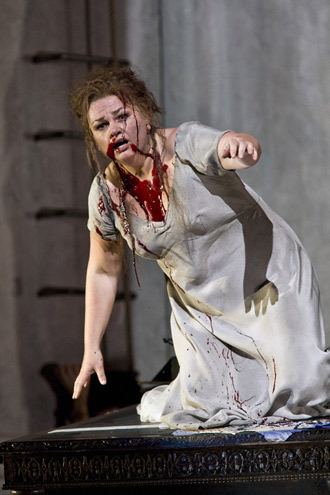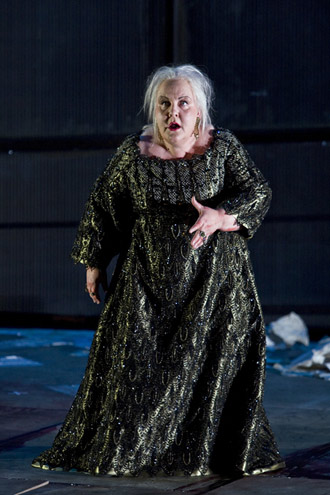Journal entries
Le Bon Journal
About
Search
Contact
Readers write
Show your support
Anne Ku writes about her travels, conversations, thoughts, events, music, and anything else that is interesting enough to fill a web page. She has written and produced two chamber operas, premiered in Utrecht, Netherlands. See her publication list for more.
Support the Bon Journal by keeping analyticalQ.com alive and free. Find out about Sponsorship or how else you can show your support
Bon Journal
Strauss' Elektra at Royal Opera House London
The aftermath of a murder. The daughter’s grief turning into revenge. The seething plot for vengeance. Return of the prodigal son to carry out the sister’s hatred of their mother, the murderer. Bloodshed everywhere.
That is basically the plot of Elektra.
Shocking.
Electrifying.
Terrifying.
 Susan Bullock as Elektra and Jane Henschel as Klytamnestra. Photo credit: Clive Barda
Susan Bullock as Elektra and Jane Henschel as Klytamnestra. Photo credit: Clive Barda
How can one sustain a climax for an hour? After I said good-bye to my dinner date on Monday 24th November 2008, I took the lift and found my seat in the ampitheatre, I sat down to expect the usual overture.
There wasn’t any.
Richard Strauss’ music plunged us into a scene of the maids cleaning the floor, never freeing from bloodstains or the shadows that haunt them. The women take turns telling the story of Elektra, the grieving daughter.
Elektra is a tragedy in one act. The music is published by Boosey and Hawkes, a representative of whom sat next to me. From my seat high above the stage, I could see the conductor Sir Mark Elder and the large orchestra. I barely noticed that the seats were closer together up here than down there (in the stalls), for the opera was gripping to the very end.


Susan Bullock as Elektra and Jane Henschel as Klytamnestra. Photo credit: Clive Barda
One can’t help ask, why was there a murder? Why did Agamemnon have to die? Why was Elektra so frantic and furious? Why did she hate her mother Clytemnestra? Why was her brother Orestes sent away?
To answer these questions, we must understand the bloody and bitter family feud that precedes this story. In the red programme book, on page 6, the synopsis begins “... two sons of Pelops, Atreus and Thyestes, became deadly enemies after Atreus punished Thyestes’ adultery with his wife by feeding his brother’s children to him at a banquet.” Reading this made me shudder. Thyestes probably didn’t know he was eating his own children! And when he found out, he cursed the house of his brother Atreus. This tragedy overspilled to the next generation. Thyestes’ only remaining son Aegisthus sought revenge by killing Atreus’ son, his cousin Agamemnon. Aegisthus did this with the help of Agamemnon’s wife Clytemnestra who was also his lover. Adultery number two. Why was Clytemnestra a willing conspirator? Agamemnon had taken her by force after killing her husband and child. Clytemnestra was the half-sister of Helen of Troy, no small fish. Agamemnon had sacrificed Iphigenia, one of their four children, to ensure a safe sea-crossing to Troy.
All this explains why there is so much bloodshed and why the blood continues to shed. Adultery. Revenge. Hatred. Madness. The sins of one generation spill over to the next. It doesn’t stop until there is forgiveness.

Johan Reuter as Orestes, Susan Bullock as Elektra. Photo credit: Clive Barda
British "dramatic" soprano Susan Bullock is convincing as the intense Elektra, who becomes increasingly hysterical and mad as the story progresses. American mezzo-soprano Jane Henschel plays her mother Clytemnestra who wakes up from a nightmare and goes to her for consolation and advice. Elektra predicts that she and her lover will be sacrificed.
The prolonged hysteria of female voices is finally broken by the rich warm voice of Danish baritone Johan Reuter who appears as the disguised brother Orestes. There is a dialogue between Elektra and Orestes before the final bloodbath.
Elektra, for me, was the most unpredictable opera I’ve ever experienced. I had not expected a tragedy, or rather, a thriller of such proportions. I would really have to dig into the programme book for the article on love-hate relationships and other background literature to Elektra. Bravo, Strauss! Bravo!

